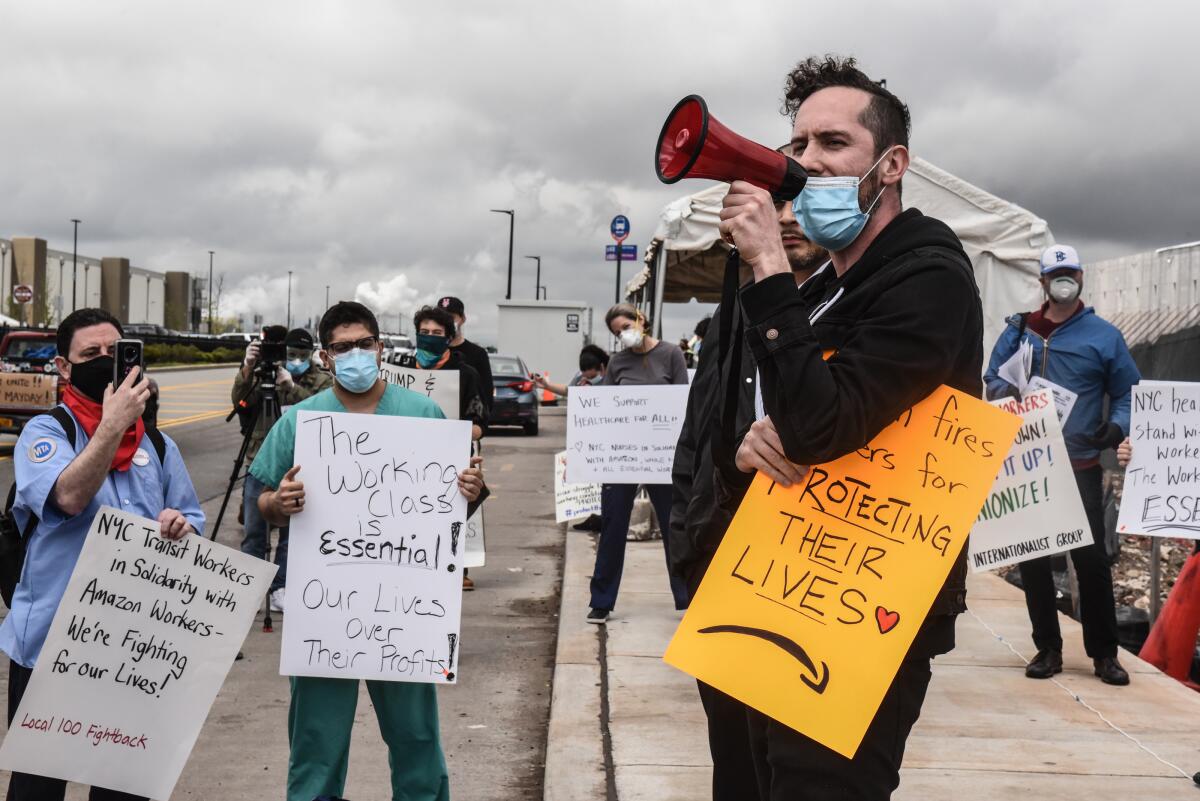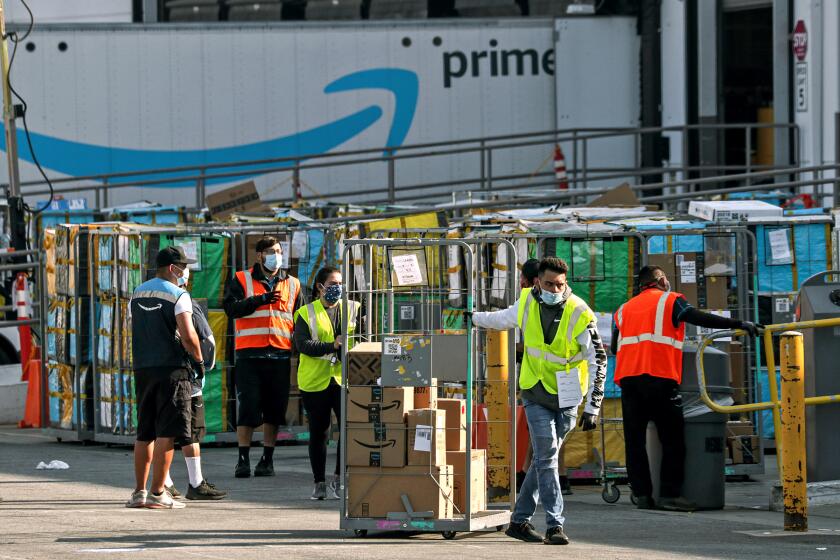Review: Exposing life in the shadows of the United States of Amazon
On the Shelf
Fulfillment: Winning and Losing in One-Click America
By Alec MacGillis
Farrar, Straus & Giroux: 400 pages, $28
If you buy books linked on our site, The Times may earn a commission from Bookshop.org, whose fees support independent bookstores.
Alec MacGillis is a responsible, serious journalist who writes for ProPublica and wins awards for his in-depth reporting on economics and society. But his new book is a horror story.
The terror hits again and again in “Fulfillment: Winning and Losing in One-Click America,” a grounded and expansive examination of the American economic divide. Whether he’s introducing an office supply entrepreneur in Texas, the leader of a Seattle gospel group or a retired Baltimore steelworker going back to work, the reader — me, you — will feel that drop in the stomach, the dread of what we know is coming. Here they are, people with dreams and families and flaws and aspirations, and something bad is going to happen to them.
That bad thing is Amazon.
This is much more than a story of retail. It’s about real estate. It’s about lobbying, data centers and the CIA. It’s about revolving doors in Washington, D.C., and cardboard folders in Ohio. It’s about a social fabric disintegrating while corporations duck paying taxes. It’s about a stunning transfer of wealth into Amazon’s coffers, all before the COVID-19 pandemic began and the company reaped even more.
“Fulfillment” is an indictment in fact but not in tone. I’ve been meaner to Amazon in these short paragraphs than MacGillis is in his entire book. There’s probably a reason the publishers left the word “Amazon” out of the title: This book is neither a hagiography nor a targeted attack. Instead, like the HBO series “The Wire,” it reveals the way economic, political and social systems affect individual stories. MacGillis wants readers to see how the systems Amazon both exploited and created affect so much of our economy, building the case brick by brick. In almost every instance, he finds a way in through a personal story or two. It takes a skillful journalist to weave data and anecdotes together so effectively.
We’re trained to see the arc of individual narratives pitted against a large corporation as David versus Goliath; it’s satisfying for small actors to have miraculous victories. But more often than not what MacGillis finds is Goliath steering a bulldozer over everything in his path.
Amazon’s campaign against a union drive in Alabama has drawn fire from President Biden.
And he’s looking closely. Where others have written of an urban-rural economic divide, MacGillis parses it to show that wealth has been concentrated in certain cities and left others behind. He looks at Seattle and Dayton, Ohio, and Washington, D.C., and Baltimore.
Unsurprisingly, the winners are Seattle, whose history and present he tells in vibrant detail, and Washington, enriched by the white-collar lobbying class. Both have been transformed by Amazon’s interests, which include a massive campus in Seattle, a second headquarters planned for outside D.C. and its cloud platform, Amazon Web Services (AWS), which has successfully turned its attention to securing government contracts.
Largely invisible to the general public, AWS is a huge part of Amazon’s business. In 2018, AWS “controlled nearly half of all spending on public cloud services; it employed some 20,000 people, up from 45 only five years earlier; and, with whopping 26 percent operating margins, the division accounted for more than half of Amazon’s entire operating income,” MacGillis writes. “Essentially, the company’s lucrative dominance of the cloud was allowing it to keep its prices so low in its original retail operation, selling items almost at a loss and thereby driving many competitors from the field altogether.”

The many threads of Amazon’s dominance include not just impossibly low prices but also all the data it gleans from sales on its site; its influence in Washington, D.C., including its founder’s purchase of the hometown paper; extraordinary tax avoidance measures; subcontracting where convenient, particularly in its delivery stream; extreme lack of transparency, even when workers die on-site; real estate deals that secure massive concessions and tax breaks. The sum total is that Amazon is one of the primary drivers of inequality, consolidating wealth in some places and damning others to tax-starved subsistence.
‘Uncanny Valley’ by Anna Wiener is a biting, funny memoir from inside San Francisco’s start-up culture.
MacGillis focuses on midsize cities, once formidable, like Dayton, which he also reported on for the PBS series “Frontline,” and Baltimore, once home to massive plants owned by Bethlehem Steel. To be a working-class person in one of these places once meant finding lifetime employment at a shoe factory, department store or in unionized manufacturing; now, the options are mostly hopping from low-paying job to low-paying job, with few benefits and many risks.
The author takes us down an emptied-out street in Baltimore where a salvage operation pulls boards and bricks from condemned row houses, then down the freeway to Washington, where the materials are used in a new condo development (studios $500,000 and up). In Ohio, a man checks his young family into a homeless shelter and then goes to work — he has a job, he just can’t make enough to keep them afloat.
Reading these people’s stories will break your heart. But you should read them. America doesn’t have to be a horror story. Economic inequality and the social rifts it intensifies don’t have to get inexorably worse. It could get better. Amazon is rich enough to improve working conditions and wages and pay its fair share of taxes.
The irony is that you, the reader — a person who cares about newspapers and cares about books — you probably have enough social and financial resources that you’re going to be fine. You probably won’t have to take a job at a packing subcontractor for $11 an hour, or be fired for using the bathroom too often, or be bound by a confidentiality agreement after your child is killed by a delivery van. The vast inequalities wrought by Amazon may be invisible to you — and yet, they’re only one click away.
The California attorney general’s office issued subpoenas in August as part of an investigation into Amazon’s protocols for protecting employees from COVID-19.
Kellogg is a former books editor of The Times.
More to Read
Sign up for our Book Club newsletter
Get the latest news, events and more from the Los Angeles Times Book Club, and help us get L.A. reading and talking.
You may occasionally receive promotional content from the Los Angeles Times.









